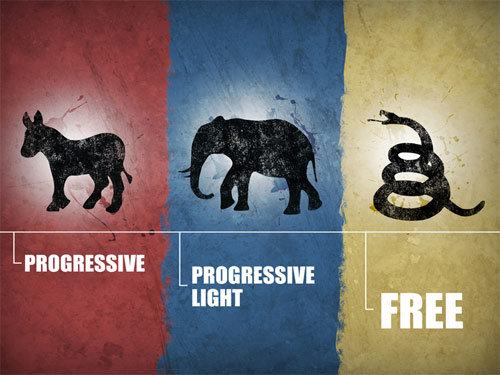Paine on Society and Government
As I mentioned in my previous post, the aim of these posts will hopefully be predominantly corrections; however, I reserve the right to chase any sparkly thing! Sometimes, I believe the sparkles and corrections may converge. Sometimes, a patriot’s writing provides a number of avenues to explore. For example, one of Thomas Paine’s most famous pieces is his political pamphlet Common Sense. It relates Paine’s distaste for the necessary “evil” of government. I wish more people would take the time to read the whole pamphlet! It turns our current notion of “left” and “right” on its ear. More important, is the responsibility it ascribes to society and government.
In Glenn Beck’s opinion, our Founding Fathers had a much less intrusive government in mind. Though I enjoyed this photo at Beck’s site, I really enjoyed his commentary on the “continuum of left and right” in our current political discussions, i.e., the claim that the GOP has moved too far to the “right.” It’s a fun episode to watch. Regardless of one’s opinion of Beck (most progressives think he’s a nut job), giving each side an honest hearing seems – well, somehow, very American. Beck thinks that the founders wanted to provide a government just small enough to avoid anarchy and allow maximum liberty – a thought that Thomas Paine also seems to share:
SOME writers have so confounded society with government, as to leave little or no distinction between them; whereas they are not only different, but have different origins. Society is produced by our wants, and government by our wickedness; the former promotes our happiness positively by uniting our affections, the latter negatively by restraining our vices. The one encourages intercourse, the other creates distinctions. The first is a patron, the last a punisher.
Society in every state is a blessing, but government even in its best state is but a necessary evil in its worst state an intolerable one; for when we suffer, or are exposed to the same miseries by a government, which we might expect in a country without government, our calamities is heightened by reflecting that we furnish the means by which we suffer! (Paine, in Common Sense)
Society encourages our virtues, government punishes our wickedness. Not much further in to Paine’s wonderful little tract, he makes it clear that security is bound up in the government’s responsibilities. He was a real word mechanic that Paine:
For were the impulses of conscience clear, uniform, and irresistibly obeyed, man would need no other lawgiver; but that not being the case, he finds it necessary to surrender up a part of his property to furnish means for the protection of the rest; and this he is induced to do by the same prudence which in every other case advises him out of two evils to choose the least. Wherefore, security being the true design and end of government, it unanswerably follows that whatever form thereof appears most likely to ensure it to us, with the least expense and greatest benefit, is preferable to all others (of course, the emphasis is mine).
Hmmm, he sounds kind of conservative. Regardless, the point I want to walk away with is that society and government are not the same, and that while we argue about what punishment is really all about (“corrections” in modern parlance), we very often fail to discuss society’s responsibility to inculcate the virtues – the four cardinal virtues, the three “theological” virtues, and of course, our civic virtue!
In future posts, whether discussing our security or the government’s punishment of wrongdoers, conceptions of these virtues will be central to many of the conclusions drawn. Consequently, at least some discussion will be aimed at an understanding of these virtues. The government’s job of security and its collateral responsibility of punishment must rely on society’s demand for virtuous conduct by our representatives. Whether right or left, Democrat or Republican, Libertarian or Progressive, one can hope that at least some of these old virtues are still shared.
A final note: Please feel free to comment and engage in a dialogue – and as long as it remains civil (now there’s a word we should explore!) the comments will be only lightly moderated. I look forward to the conversation!


